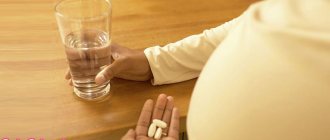Types of diarrhea
There are several types of diarrhea depending on the reasons that caused it:
- Osmolar . This type of diarrhea occurs in situations where the absorption of substances from the intestinal lumen is impaired. Changes lead to the development of dysbiosis, destruction of the gastrointestinal mucosa, and can also cause enzyme deficiency. Osmolar diarrhea is manifested by copious loose stools with particles of undigested food.
- Secretory . Diarrhea in pregnant women, especially in the early stages, appears due to the inability of the intestinal wall to absorb nutritional components, which often leads to the development of infectious processes of various etiologies. The disorder is manifested by profuse watery diarrhea with greenish patches.
- Hyperexudative . Profuse diarrhea mixed with bloody lumps or pus, as well as severe abdominal pain, accompanies diseases such as shigellosis, Crohn's disease, salmonellosis, ulcerative colitis and some other inflammatory processes of the gastrointestinal tract. Diarrhea is also one of the diagnostic signs of carcinoma.
- Hyper- and hypokinetic . These types of diarrhea are caused by changes in intestinal motility: when it slows down, hypokinetic occurs, and when it accelerates, hyperkinetic. This happens due to nervous disorders, as well as with an overdose of certain medications. The stool is a pasty mass; the frequency of bowel movements can reach several times per hour.
Diarrhea and its clinical picture during pregnancy
A disorder such as diarrhea during pregnancy is very easy to recognize. Its main symptom is loose stools, which are observed more than three times a day. It may be watery, foamy, or in the form of a paste. In addition, other symptoms are sometimes observed:
- bloating, pain in the abdomen;
- nausea, vomiting;
- headache;
- general weakness.
Diarrhea is often accompanied by bloating, abdominal pain and other symptoms.
How serious the problem is can be assessed by the appearance of the stool and the degree of general malaise. The expectant mother should be alert to the following signs (all of them require seeing a doctor):
- there are mucus or traces of blood in the stool;
- the stool is black in color, accompanied by weakness and dizziness (this may indicate internal bleeding);
- diarrhea does not go away within a few days (despite treatment).
Video: stomach upset in pregnant women
Causes
Diarrhea during early pregnancy can occur for various reasons.
Let's consider the most likely of them:
- hormonal changes in the body and toxicosis can lead to the fact that in addition to vomiting, other digestive disorders occur, including diarrhea, abdominal pain, flatulence;
- excessive anxiety negatively affects the state of the nervous system, which can provoke diarrhea of psychosomatic origin;
- changes in the usual diet due to the emergence of new taste preferences and the combination of incompatible products, for example, milk and pickles;
- ingestion of stale or expired food;
- relapses of chronic inflammatory diseases of the gastrointestinal tract (colitis, dyskinesia, gastritis);
- infection with parasites is often accompanied by disturbances in intestinal function;
- Excessive use of laxatives for constipation.
What is the danger of diarrhea for the health of mother and child?
The danger of diarrhea for a pregnant woman and fetus depends on the duration of the disorder and the cause that caused it. Minor diarrhea does not pose a threat to the health of the fetus. If loose stools are observed more than three times a day and do not stop for several days, and even more so when it is combined with vomiting, then the body inevitably loses moisture (dehydration occurs) and beneficial microelements. This negatively affects the functioning of the pregnant woman’s internal organs and the access of oxygen and nutrients to the child.
Dehydration makes itself felt with characteristic symptoms:
- dry mouth;
- darkening of urine, lack of urge to urinate;
- dizziness, drowsiness;
- constant desire to drink;
- Sometimes a slight increase in temperature is possible.
If diarrhea is accompanied by at least one of these symptoms, the pregnant woman must call an ambulance.
If diarrhea is caused by a viral infection or toxins, then it is fraught with intoxication of the body, which also affects the child.
Severe diarrhea is especially dangerous in the early stages, when the baby’s main organs are developing. Insufficient supply of oxygen, vitamins, and minerals can cause disruptions in this important process. The result can be a frozen pregnancy, the occurrence of congenital pathologies in the fetus, and a delay in its development. Also, in the first trimester, diarrhea can provoke an increase in uterine tone, which can lead to miscarriage or partial detachment of the fertilized egg (threat of miscarriage).
In the later stages, such digestive disorder increases the risk of premature birth (due to increased contractions of the uterus), as well as hypoxia in the fetus (insufficient oxygen supply occurs, which interferes with normal development and can even lead to death).
Is it dangerous?
The danger of diarrhea in early pregnancy is determined by the degree of its severity, regardless of when it occurred: before or after the delay. Diarrhea caused by simple indigestion goes away quickly and does not require special treatment, unlike infectious diarrhea, which requires therapy under the supervision of a doctor.
The main danger is as follows:
- strong spastic contractions in the abdomen can lead to hypertonicity of the uterus, which is dangerous due to the threat of miscarriage;
- the infection has the ability to penetrate the embryo and cause disturbances in its development;
- diarrhea of infectious etiology is often accompanied by hyperthermia, which is also extremely undesirable in the early period of pregnancy;
- toxins can pass through the bloodstream to the unborn child.
Diarrhea as a sign of pregnancy: causes of diarrhea and methods of treatment - Gastro Portal
- Home pageDiarrhea
- The first signs of pregnancy are varied, often manifesting several symptoms at the same time.
- In addition to delayed menstruation, morning sickness, increased fatigue, constant drowsiness and diarrhea are observed as signs of pregnancy.
- Associated symptoms require consultation with a doctor; they may be harbingers of the onset of pregnancy and the first manifestations of diseases of a woman’s internal organs.
Is diarrhea a symptom of pregnancy?
After conception, significant changes occur in all body systems. The main hormones that act throughout pregnancy are progesterone and estrogen; as the fetus develops, their ratio changes, shifting to progesterone predominance.
The digestive system is one of the first to react, due to its close location, and the peculiarities of the neuro-hormonal regulation of gastrointestinal disorders. Diarrhea in the early stages of pregnancy before delay, vomiting, nausea, discomfort in the abdominal area with cramps are standard symptoms.
Loose stools can be observed due to stress or the accumulation of an intestinal infection when immunity is reduced due to stress, or a slowdown in basal metabolism during pregnancy.
If prolonged diarrhea occurs without obvious reasons - poisoning, emotional outbursts, the prevalence of dairy products in the diet, you must consult a doctor for a thorough diagnosis, determine the causes of the disorders or the first signs of toxicosis with diarrhea.
In combination with what signs does diarrhea indicate pregnancy?
When seeking medical advice to determine fertilization or the presence of other pathologies, the doctor establishes characteristic clinical symptoms in addition to diarrhea:
- Delay and disrupted monthly cycle. If the duration is 10-14 days, it is necessary to do a test and consult a gynecologist-endocrinologist to rule out reproductive disorders or hormonal imbalances in the woman’s body. There is a colored pregnancy with characteristic brownish discharge in the first months of gestation.
- The presence of nausea, if the onset of nausea occurs in the morning, over a long period of time, may be the primary symptom.
- Sensitivity, swelling, engorgement of the mammary glands with the presence of uniform compaction are signs of pregnancy in addition to diarrhea.
- The predominance of inhibition processes in the cerebral cortex and hormonal imbalance can cause drowsiness and increased fatigue in pregnant women.
- Exacerbations of the senses - intolerance to smells, taste distortions when eating familiar foods.
- An increase in basal temperature with diarrhea and even a slight low-grade fever when measuring general body temperature.
If diarrhea, a sign of pregnancy in the early stages, is combined with one or more symptoms, you need to go for examination to a gynecologist.
He will take a blood test for the hCG hormone and determine the due date using ultrasound diagnostics using a vaginal sensor.
How to deal with diarrhea?
Doctors rarely prescribe medications during pregnancy, as they can have a negative effect on the growing body. For this reason, when signs of diarrhea appear during early pregnancy, doctors advise adjusting the daily menu, eliminating foods that can worsen diarrhea, and adding dishes that have an astringent effect.
If the problem does not disappear after 1-2 days, then drug treatment is often impossible. During pregnancy, you should never choose your own medications: this should only be done by a doctor.
To eliminate diarrhea, adsorbents are usually recommended:
- Activated carbon;
- Polyphepan;
- Enterosgel.
These drugs are completely safe for pregnant women, but they should not be taken uncontrollably. Sorbents should not be taken at the same time as vitamins, as the effect of taking the latter disappears.
For severe diarrhea, you should also take Trisol or Regidron, which maintain the water-salt balance in the body at the level necessary for normal functioning.
Treatment at home
If diarrhea during pregnancy was not accompanied by the above dangerous symptoms, it can be treated at home, after consulting with your doctor:
- Hydration is the most important thing for diarrhea. It is important to drink as much fluid as possible. The most common water, herbal decoctions, infusion of rose hips, and strong black tea will do. You can prepare a Regidron solution or make a saline solution yourself.
- Follow a diet so that the stomach and intestines rest and unload: eat low-fat fermented milk products (especially natural yoghurts without additives - they contain beneficial bifidobacteria), water porridge, white bread crackers. You are allowed to drink strong black tea and water. Chicken, meat, butter, milk, fresh fruits and vegetables cannot be eaten without heat treatment.
- Drug treatment should always be discussed with a doctor. It is unacceptable to take medications during pregnancy without the approval of a doctor - this can cause serious harm to the baby.
Traditional methods
Waiting for a baby is a period when it is extremely undesirable to take many medications, because they can harm the development of the child. When diarrhea occurs during pregnancy, women try to get rid of the disease without the use of medications, especially in the early stages, because in the first 12 weeks after conception, the most important stage occurs - the formation of all systems and organs of the fetus. Even a seemingly harmless medicine can disrupt this important process.
Therefore, expectant mothers often resort to the advice of traditional medicine:
- A decoction of blackberry leaves. Pour 250 ml of boiling water over a handful of greens and place in a dark place to steep. After the broth has cooled, strain and drink 2 tbsp. l. three times a day.
- Starch solution. Add 2 teaspoons of potato starch to a glass of warm water, stir and drink.
- Blueberry jelly. Drink half a glass of the finished drink after each meal.
- When the cause of diarrhea is a nervous disorder, you can brew tea with lemon balm or chamomile. These herbs have a sedative effect.
- Pomegranate drink. Brew crushed pomegranate peel with a glass of boiling water, after steeping, drink 100 ml twice a day.
Also, if you have severe diarrhea, be sure to drink enough water to replenish the loss of fluid in the body. Treatment with medicinal herbs is possible only if the woman has not previously shown an allergy to them, and also if they do not have a tonic effect on smooth muscles.
The following fees are safe for expectant mothers:
- wormwood, thyme, alder cones and falconer;
- chamomile flowers, oak bark, plantain and cinquefoil root;
- strawberry leaves, calamus and calendula.
General recommendations for eliminating diarrhea in the early stages
Of course, when it comes to diarrhea, the main task is to replenish lost fluid. You need to drink 3 or more liters of clean water per day, preferably warm. If a woman is sure that diarrhea was not caused by an infection or disease of the internal organs, she can help herself. There are special safe drugs in pharmacology, and traditional medicine in this regard is no worse at eliminating diarrhea.
Honey preparations
The first medications prescribed to help with loose stools are absorbents. They are like a sponge capable of absorbing harmful toxins and removing them safely from the body.
These include:
- lactofiltrum;
- polysorb;
- Activated carbon;
- enterosgel;
- polypephane;
- smecta.
To retain fluid in the body, drink a solution of rehydron or trisol.
The rest of the drug therapy should be carried out only under the guidance of a doctor: he can prescribe medications to relieve spasms, sedatives, antibiotics and probiotics to restore the intestinal microflora.
Folk remedies
To replenish lost fluid, you can prepare a solution at home. Add 18 grams of sugar and 3 grams of salt to 1 liter of clean water. Use the solution in unlimited quantities, but in small sips.
Prevention
From the moment a woman learns that she will become a mother, she should seriously think about her diet. It is a balanced diet during early pregnancy that allows the fetus to receive all the necessary nutrients for development and protects the expectant mother from possible digestive disorders.
Pregnant women should adhere to the following nutritional recommendations:
- Eat often, but in small portions, and try not to exceed the daily caloric intake by more than 10-15% of the usual values.
- There is no need to “eat for two,” because this can lead not only to eating disorders, but also to excess weight.
- Try to avoid exotic, previously untried dishes, as this can lead to vomiting or diarrhea.
- Don't overeat.
- Eat only fresh foods.
- Before eating raw vegetables or fruits, they must be thoroughly washed under running water.
- Meat and fish should be consumed only after preliminary heat treatment, since insufficiently fried products may contain parasites.
- Be sure to wash your hands before eating and after returning from the toilet or crowded places.
- During an epidemic, try not to visit crowded places, as the risk of contracting the disease increases.
Diarrhea during pregnancy is in most cases easily treatable, but it is better to try to avoid this unpleasant condition. It is necessary to adhere to the above nutritional rules, and also monitor not only the quality, but also the quantity of foods consumed.
Author: Violeta Kudryavtseva, doctor, especially for Mama66.ru











